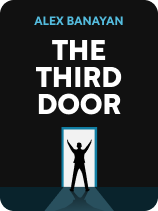

This article is an excerpt from the Shortform book guide to "The Third Door" by Alex Banayan. Shortform has the world's best summaries and analyses of books you should be reading.
Like this article? Sign up for a free trial here.
Are you clear on what you value most? How does that translate into your life and career choices?
Alex Banayan interviewed some of the world’s most successful people for his book The Third Door. One theme that kept coming up was the importance of staying true to yourself and what matters most to you, even if that means making difficult choices.
Keep reading to learn why it’s important that you stick to your values on your journey toward success.
Stick to Your Values
Banayan heard from several of his interviewees how important it was to stick to your values and to design your life’s choices around them. Let’s see what each one had to say.
Steve Wozniak: Align Your Actions With Your Values
When Banayan met with Steve Wozniak, the co-founder, along with Steve Jobs, of Apple, he found someone who didn’t fit the mold of an extremely successful businessperson: Wozniak defined success not by typical hallmarks like power, fame, or wealth, but by how his actions aligned with his values and how that led to personal happiness.
Wozniak said that society expects people to pursue power and money, but he decided early in his career that those goals wouldn’t make him happy. Instead, he had two goals: to create something—through engineering—that would benefit the world, and to live his life “on his own terms”: In other words, to do things he wanted to do rather than what society expected him to do.
To accomplish those goals, he lived according to his personal values. As such, he turned down executive positions at Apple, choosing instead to remain an engineer—a role that made him happier.
It also meant being honest and treating people well. One incident that showed this in action was when he discovered that Jobs had denied stock options to some of Apple’s earliest workers before the company’s public offering. Wozniak righted this wrong by gifting them some of his own shares. These shares, which he could have kept for himself, went on to make millions.
(Shortform note: Wozniak’s instinct to choose two overriding goals for his life aligns with advice from Brené Brown, who notes, in Dare to Lead, that when identifying which values you’ll focus on, you should choose just two overriding values. If you have more than this, they’ll become meaningless. These two broad values will then inform all your other values. Wozniak’s goals spoke to his values of prioritizing engineering and having freedom of thought and action, and they, in turn, allowed him to live according to his other values, such as treating people well even if it meant sacrificing some of his own wealth.)
Jessica Alba: Focus on What Ultimately Matters Most—Life
Jessica Alba found success both as a leading actress in Hollywood and as the founder of a billion-dollar startup, The Honest Company. She told Banayan that what drove her, particularly with regard to her business, was her sense of mortality: her awareness of life, death, and health.
She came to appreciate the importance of life and health after she became a mother. This was especially true because she’d witnessed numerous family members go through cancer and Alzheimer’s, and after the birth of her child, she developed a strong desire to stay alive and healthy for the sake of her growing family.
When her son was young, Alba couldn’t find baby products without allergens and harmful chemicals. Inspired by this difficulty, she set out to create a company that would fill that gap in the market. She saw it as a way to give people more control over their health—she noted that a person’s health is affected by a combination of many things, but at the very least, we can control what we put in our bodies and what we bring into our homes. Because many other people also share these same values—fears of death and illness and desire for control over health—her company struck a chord with customers and launched her to success.
(Shortform note: The Honest Company’s mission aligns with advice from many thought leaders: In your approach to life, focus on what you can control and ignore the rest; in this case, while we can’t ultimately control what happens to our health or when we die, we can control our choices, and in doing so, we can improve the odds of having good health and a long life. Alba’s company was successful because she tapped into not only the human instinct to value life, health, and control but also the instinct to protect and care for our loved ones—which many experts, such as Jonathan Haidt in The Righteous Mind, attribute to our evolutionary need to work as a group to improve our chances of survival.)
Tony Hsieh: Be Honest With Yourself About Your Motivations
Tony Hsieh, founder of online clothing store Zappos and author of the best-selling Delivering Happiness, had insights on values that surprised Banayan: He said it’s important to acknowledge your true motivations for completing a project, even if those motivations include things like vanity or money—egotistical values most people dismiss as superficial and not worth pursuing.
He argues that, while ego can be unhealthy, it’s OK to let ego be part of your motivation as long as it’s not the only thing driving you. Wanting the recognition or prestige that comes with success is a natural human desire, and instead of denying that such things are important to you, you should accept that such values can coexist with other, more worthwhile, values like wanting to help people.
When he published Delivering Happiness, Hsieh was honest with himself that he wanted the book to hit the bestseller list because it appealed to his ego. Acknowledging that aspect of his motivations helped him choose the right tactics to launch the book successfully and allowed him to then succeed with his other motivations, which included making a difference in people’s lives—a deeper, more altruistic motivation that coexisted with his egotistical motivations.
| Honestly Follow Your Ego—Up to a Point In his best-selling book Delivering Happiness, Hsieh elaborates on his theories of values, he encourages readers to question their motivations by asking “why” until they’ve arrived at the underlying motivation driving all the others. For example, if your goal is to spend more time with your family, asking yourself “Why” might prompt you to say, “So I can create more memories,” and asking “why” again will inspire you to dig deeper and deeper until you arrive at your most important value. In Delivering Happiness, Hsieh maintains that the ultimate motivation underlying most goals is usually happiness, and to that end, the egotistical desires he speaks to Banayan about might be seen as ways to achieve happiness. Hsieh’s recommendations align with what he told Banayan in The Third Door: Be honest with yourself about your motivations. However, while Hsieh argues egotistical desires can be legitimate sources of motivation, he’s not arguing that you let your ego completely drive you. His caution aligns with that of other experts, like Ryan Holiday, who explains, in Ego Is the Enemy, that ego can prevent you from achieving your dreams when it leads you to believe that you’re better than other people or more deserving of success—beliefs that will cause you to behave badly and make poor decisions. Holiday does acknowledge, though, like Hsieh, that ego can be healthy. He defines a healthy ego as a type of self-esteem that’s based on actual accomplishments instead of false beliefs of superiority. Hsieh doesn’t specifically define ego in this way, but his focus on the egotistical feelings that accompany achievement implies a similar outlook. |

———End of Preview———
Like what you just read? Read the rest of the world's best book summary and analysis of Alex Banayan's "The Third Door" at Shortform.
Here's what you'll find in our full The Third Door summary:
- That there are three doors in life—but most people only know about two
- Insights, tricks, and motivations to help you find your path to success
- Advice from some of the world's most successful people






